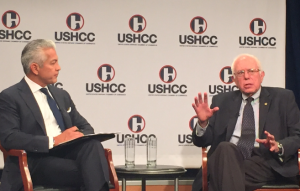
On Thursday, Bernie Sanders, Independent senator from Vermont and a 2016 Democratic candidate for president, spoke at a U.S. Hispanic Chamber of Commerce (USHCC) Q&A discussion where he sought to outline his candidacy to the business group and explain what sets him apart from the other Democratic candidates, particularly former secretary of state Hillary Clinton.
Sanders spoke at length about income inequality and was asked by USHCC president and CEO Javier Palomarez to outline exactly what a Sanders candidacy would offer the Hispanic community. Sanders repeated that his economic agenda “will be a proposal I think many Hispanic families will respond to” because the proposals are geared towards improving the conditions of Americans on the lower end of the socio-economic spectrum.
While Sanders points to the large crowds his campaign has been gathering at rallies across the country and polls in the early primary and caucus states of New Hampshire and Iowa as proof that his agenda is catching on and resonating with the American people, Palomarez asked if it was realistic to believe that he could win the nomination from Clinton. Sanders was optimistic in his response, saying that “I’m not guaranteeing victory, but I think we have a good chance to win if we can develop that grassroots movement throughout the country.”
On trade and immigration, Sanders faced tougher lines of questioning not only from USHCC’s Palomarez, but also from members of the media who pressed the senator to explain his position towards the recent TPP trade agreement and his vote against an immigration reform bill in 2007.
Sanders tackled the first issue of trade by articulating his positon that he is indeed in favor of trade but that the trade agreements of the last two decades, from both parties, did not do enough to protect the American worker and instead encouraged a rapid “race to the bottom” whereas US companies would shift jobs overseas in favor of cheaper labor costs.
On immigration, Sanders voiced his strong support for immigration reform while explaining his rationale for voting against the 2007 measure in the Senate. According to Sanders, the idea of lifting the legal immigration cap from about 60,000 per year to around 250,000 per year would flood the US job market with unskilled laborers and in turn depress wages here in the US. Noting a recent study that estimated the real youth unemployment for Hispanic youth in this country stands at around 36%, Sanders said he couldn’t support the 2007 version in light of those number and the unintended consequences to American workers and families.
Sanders gave an unequivocal “no” when asked if he would seek the presidency in a third party bid should he not win the Democratic nomination. And “the reason for that is I do not want to be responsible for electing some right-wing Republican to be president of the United States.”

Recent Comments